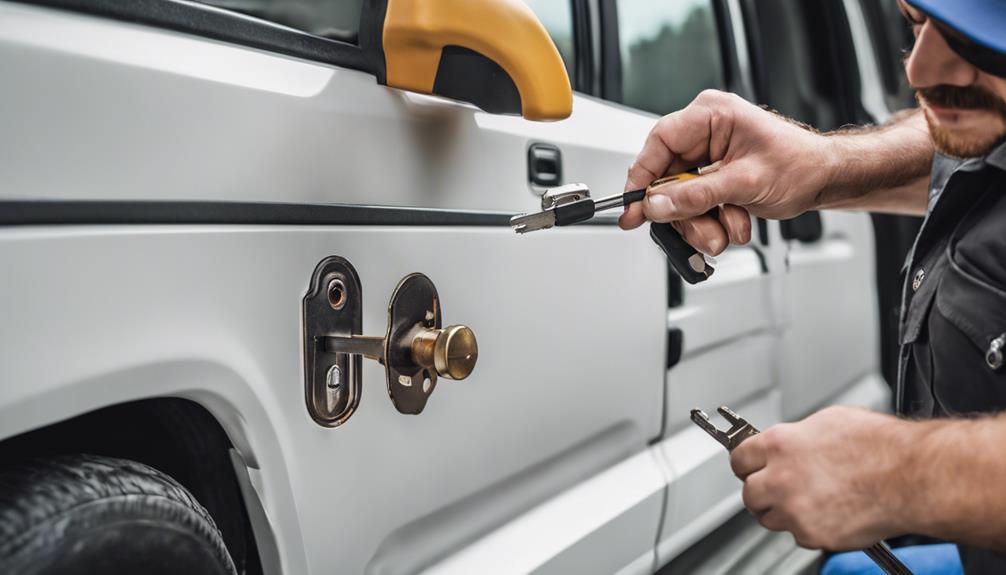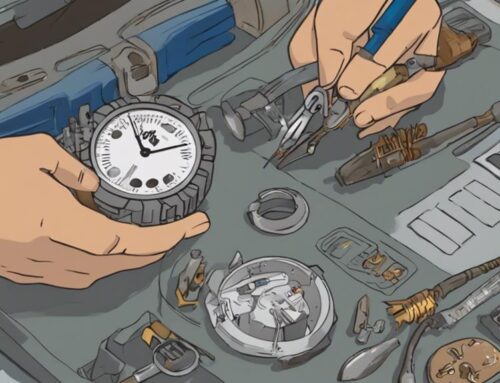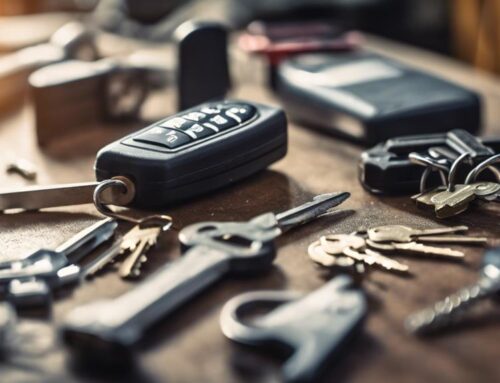After a broken key extraction, a locksmith can rekey or repair your lock efficiently, often providing a cost-effective solution. Rekeying changes the lock's pins to fit a new key, enhancing security and rendering old keys useless. If the lock mechanism is still functional and damage is minor, repair is a viable option, preserving durability and key compatibility. Replacement becomes necessary for severely damaged locks or multiple key extraction incidents. Evaluating the lock's condition is essential to decide between rekeying, repairing, or replacing. Consider the benefits of each option for maintaining security and peace of mind.
Key Takeaways
- Locksmiths can rekey or repair locks after key extraction if the lock mechanism is intact.
- Rekeying is cost-effective for key issues, while repairing is suitable for minor damage.
- Replacement is necessary for significant wear or multiple key extraction incidents.
- Consider the lock's condition and quality to determine rekeying, repairing, or replacing.
- Professional locksmith services ensure proper handling, with new locks offering security upgrades.
Rekeying vs. Repairing vs. Replacing
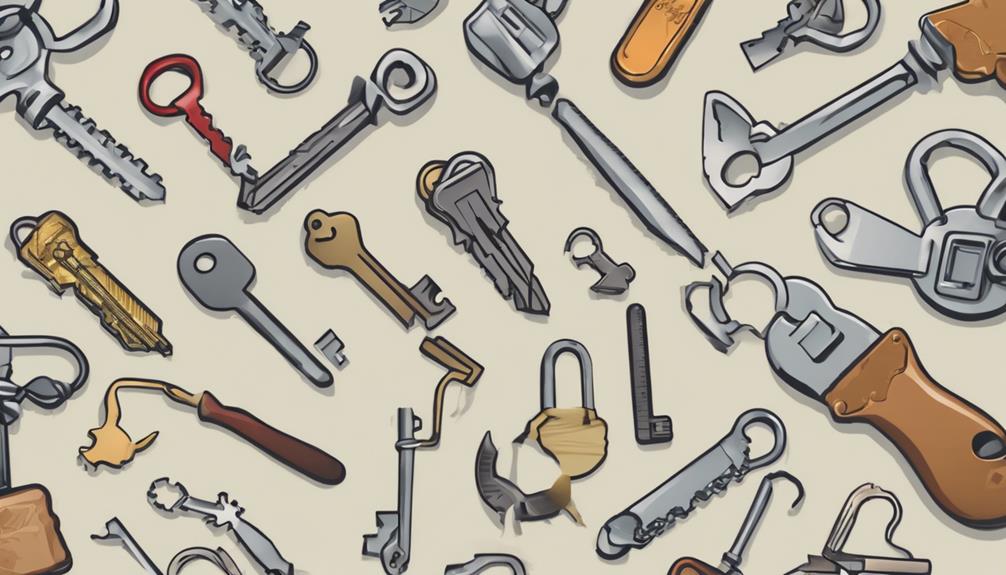
When faced with the dilemma of a broken key, it's important to weigh your options between rekeying, repairing, or replacing the lock. Lock maintenance is vital to guarantee your security. If the lock is in good condition and only the key is the issue, key extraction and rekeying might be the way to go. This process involves changing the pins inside the lock to fit a new key, rendering the old one useless. However, if the lock itself is damaged due to the broken key, repairing it might be necessary. In some cases, replacing the lock altogether could be the best solution for peak security. Remember, a broken key doesn't have to break your spirit – just find the right solution! If you want to learn more about the cost-effectiveness of rekeying versus replacing locks, check out Rekeying vs. Replacing Locks: Which Is More Cost-Effective for a detailed comparison.
When to Rekey a Lock
To determine the appropriate time for rekeying a lock, it is essential to assess the security risks and maintenance needs of your current lock system. If you have recently experienced a broken key extraction, it might be a good opportunity to contemplate rekeying your lock. Below is a table outlining key situations when rekeying a lock is recommended:
| Situation | Recommendation |
|---|---|
| Moved to a new place | Rekey the locks |
| Lost keys | Rekey the locks |
| Roommate moved out | Rekey the locks |
| Old lock system | Rekey the locks |
| Increase security measures | Rekey the locks |
When to Repair a Lock
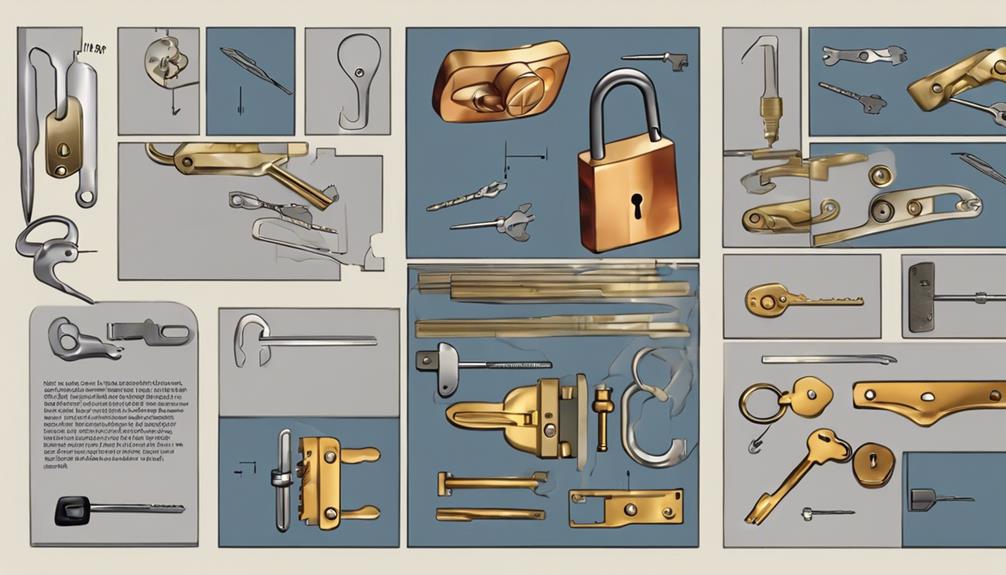
In evaluating the condition of a lock, it is essential to contemplate whether repair is a viable option. When considering lock maintenance after a key extraction, you should assess the extent of damage. If the lock mechanism is still functional and the damage is minor, repair could be a cost-effective solution. Common issues like bent pins or misaligned components can often be fixed without replacing the entire lock. However, if the lock shows signs of significant wear and tear, constant malfunctions, or severe damage, replacement might be the better choice. A skilled locksmith can inspect the lock thoroughly to determine if repair is feasible. Remember, maintaining your locks regularly can prevent many issues that may require repair or replacement. Additionally, understanding the differences between lock replacement and repair, as elaborated in Lock Replacement vs. Repair: Which Is Right for You, can help you make an informed decision.
When to Replace a Lock
Evaluating the condition of a lock plays a key role in determining whether replacement is necessary. When reflecting on whether to replace a lock after a broken key extraction, keep these points in mind:
- Extent of Damage: If the lock shows significant wear and tear beyond repair due to the key extraction process, replacement might be the best option. It's crucial to evaluate the potential costs involved in lock replacement (Understanding Lock Replacement Costs) to make an informed decision.
- Frequency of Issues: If you've had multiple key extraction incidents or notice consistent problems with the lock, it may be time to opt for a new one to improve security.
- Age of the Lock: Older locks that have undergone key extractions and lack proper maintenance might benefit more from replacement to guarantee maximum security.
Factors to Consider
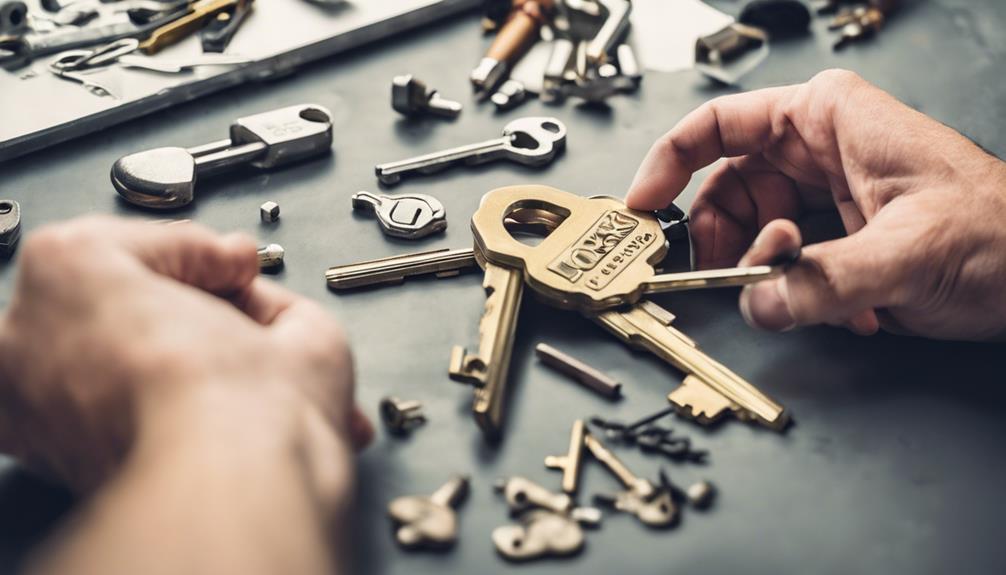
When considering factors for broken key extraction and evaluating whether a lock needs replacement, it is essential to carefully examine the overall condition of the lock. Look for signs of wear and tear, rust, or other damage that may have been exacerbated by the key extraction process. Consider how well the lock has been maintained over time; locks that have received regular maintenance are more likely to be salvageable. Additionally, the type and quality of the lock will play a role in determining whether it can be repaired or if replacement is necessary. A sturdy, well-made lock may be worth repairing, while a cheaper, less secure lock might benefit from an upgrade after a key extraction mishap. It's important to assess the lock's durability and materials used, as discussed in a comparison between DIY lock repair and locksmith services on illchangethislater.com.
Benefits of Rekeying
When considering the benefits of rekeying, you'll find that it offers a cost-effective solution to address security concerns. By opting to rekey your locks instead of replacing them entirely, you can save on expenses while still enhancing the security measures of your property. This process allows you to maintain the integrity of your existing hardware while ensuring that only authorized individuals have access to your space.
Cost-Effective Solution
For those seeking a cost-effective solution when dealing with broken key situations, rekeying can be a highly beneficial option to contemplate. Here are three reasons why rekeying is a great choice:
- Cost-Effective: Rekeying is often more affordable than replacing the entire lock. If you're looking to access savings, rekeying can be a wise investment (Accessing Savings).
- Enhanced Security: It allows you to maintain the integrity of your lock system without the need for a complete overhaul.
- Convenience: Rekeying is a quicker process compared to replacing the lock entirely, saving you time and hassle.
When it comes to lock maintenance and key management, rekeying offers a smart solution that doesn't break the bank. So, next time you're faced with a broken key extraction, consider rekeying as a pocket-friendly alternative.
Enhances Security Measures
To enhance the security measures of your property, rekeying your locks offers a proactive approach that fortifies your overall safety. When considering security upgrades, rekeying is a cost-effective and efficient method to guarantee your property remains secure. By changing the internal pins of the lock, rekeying renders old keys useless, preventing unauthorized access and enhancing your peace of mind. In emergency measures, such as after a key extraction, rekeying provides a quick solution that maintains the integrity of your existing lock while improving security. Take a look at the table below to understand how rekeying enhances your security measures:
| Benefits of Rekeying | |
|---|---|
| Renders old keys useless | Prevents unauthorized access |
| Enhances security measures | Quick solution in emergencies |
| Maintains lock integrity | Improves overall safety |
Benefits of Repairing
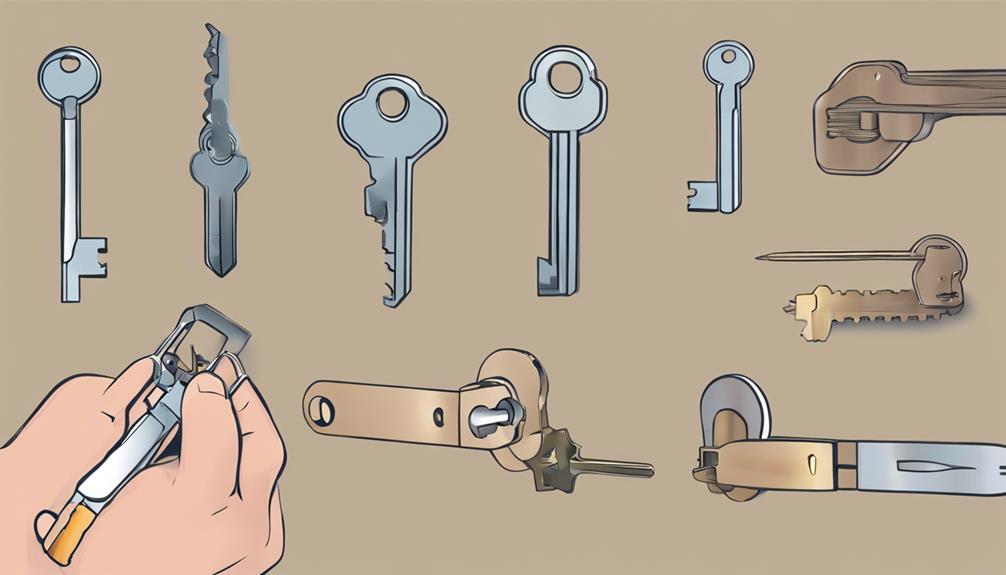
Opting to repair your broken key offers various benefits that can save you time and money. Here are some reasons why repairing your lock after a broken key extraction might be the way to go:
- Preserves Lock Durability: Repairing the lock maintains its strength and longevity, ensuring it continues to provide security for a long time.
- Ensures Key Compatibility: By repairing the lock, you can retain the key compatibility, saving you from having to replace all keys associated with the lock.
- Cost-Effective Solution: Repairing a lock is often more budget-friendly than a complete replacement, allowing you to save some extra cash for your locksmith emergency fund.
Benefits of Lock Replacement
Preserving the security of your property is paramount, and sometimes, a broken key extraction might lead you to contemplate the benefits of lock replacement. When considering lock replacement, you're not just getting a new key; you're investing in enhanced security for your home or business. Upgrading your lock can provide increased durability, ensuring it can withstand wear and tear over time. Additionally, opting for a new lock allows you the opportunity to incorporate security upgrades that may not have been available with your old lock. By replacing your lock, you're not only ensuring the safety of your property but also gaining peace of mind knowing that your security measures are up to date and reliable. Essential Lock Replacement for Business Security
Conclusion
To sum up, when faced with a broken key in your lock, it's important to weigh the options of rekeying, repairing, or replacing the lock. While rekeying offers a cost-effective solution, repairing can restore the functionality of the lock. However, if the damage is extensive, a lock replacement may be necessary for enhanced security. Consider the benefits of each option carefully to make the best decision for your property's safety and security.

